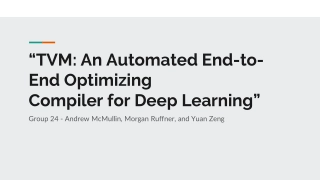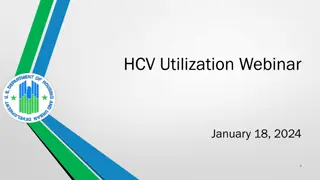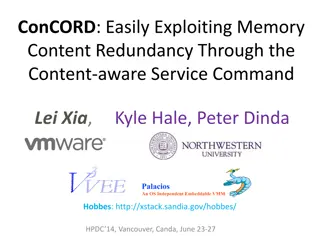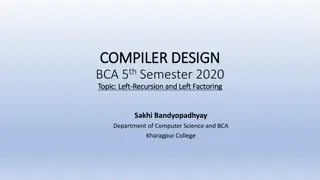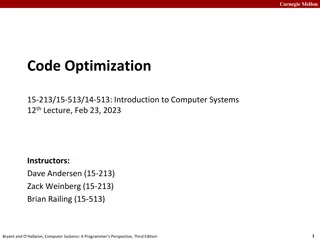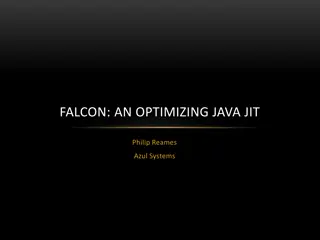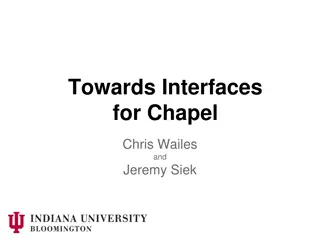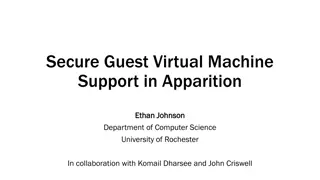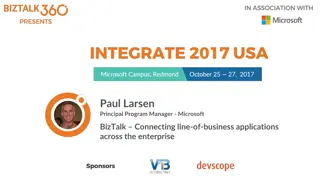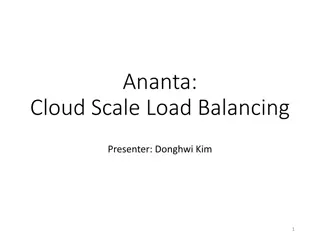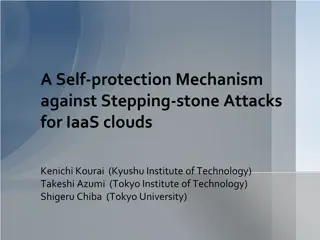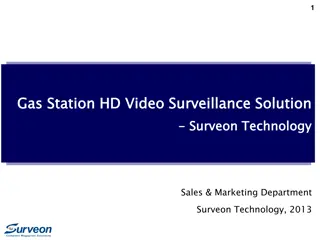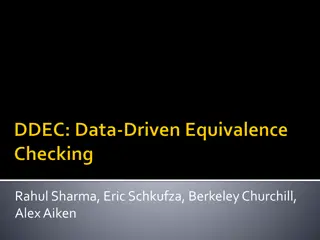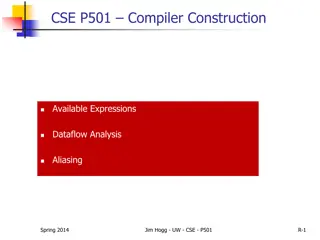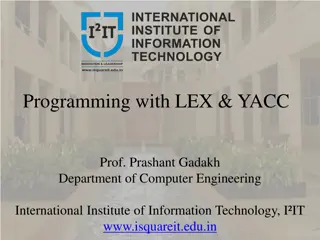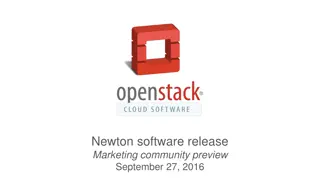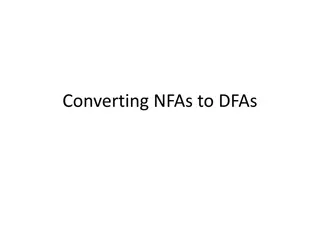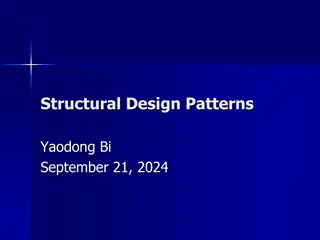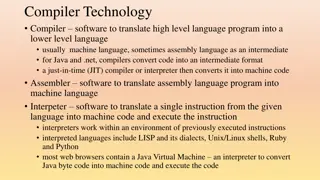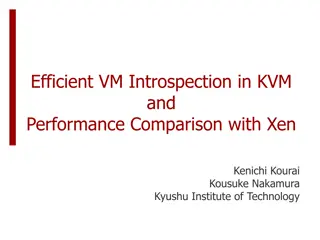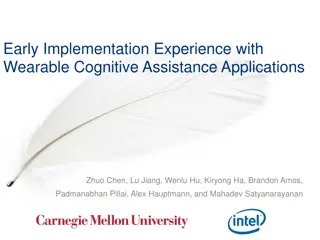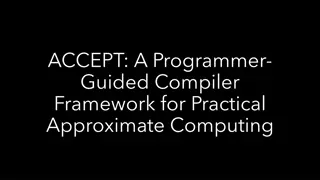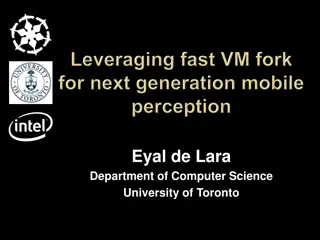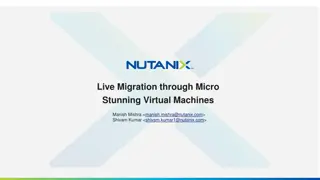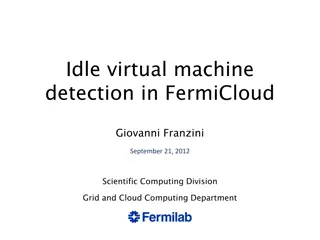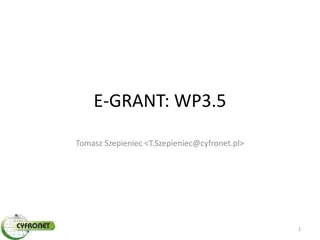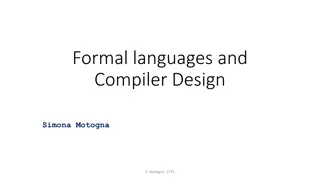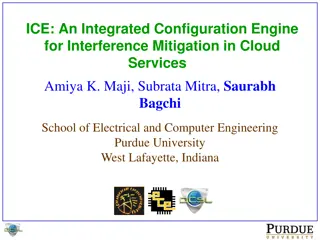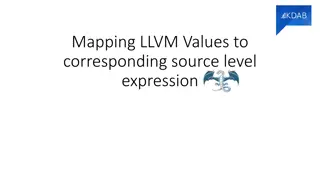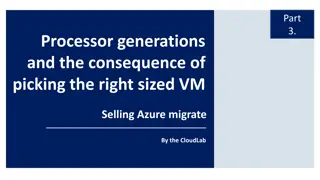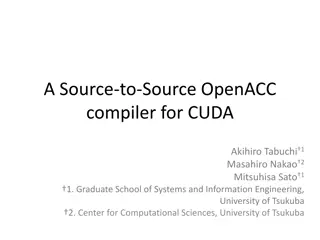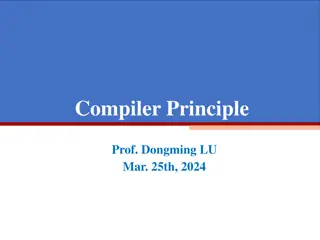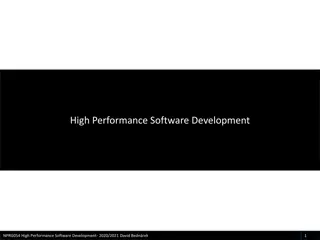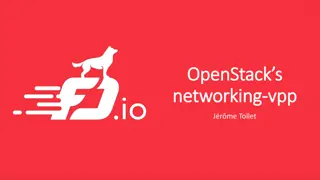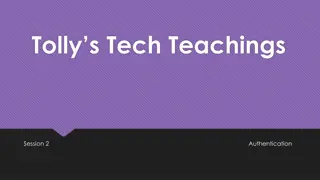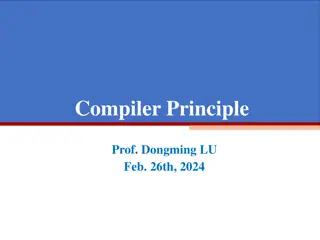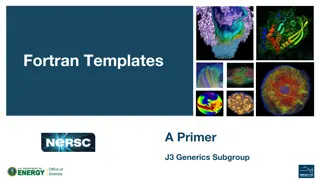TVM: An Automated End-to-End Optimizing Compiler for Deep Learning
TVM is a compiler that generates optimized code for diverse hardware back-ends from high-level specifications of deep learning programs, addressing the challenges of diverse hardware characteristics.
6 views • 16 slides
HCV Utilization Webinar
Today's webinar covers topics such as 2023 reconciliation, 2024 funding projections, PIC data cleanup, special purpose voucher updates, and more. Presenters from the US Department of Housing & Urban Development share important information and reminders regarding VMS data submission deadlines, eVMS u
0 views • 17 slides
Dressing for College and Career Success Guidelines at VMS
Learn the expectations for dressing at VMS to represent your best self, including guidelines for shorts, skirts, dresses, pants, and shirts. Understand the procedures in case of a dress code infraction and consider important questions before choosing your outfit. Remember, being yourself is always e
0 views • 5 slides
ConCORD: Exploiting Memory Content Redundancy Through Content-aware Services
Memory content-sharing detection and tracking are crucial aspects that should be built as separate services. ConCORD, a distributed system, efficiently tracks memory content across entities like VMs and processes, reducing memory footprint size and enhancing performance. The implementation involves
0 views • 56 slides
Understanding Left Recursion and Left Factoring in Compiler Design
Left recursion and left factoring are key concepts in compiler design to optimize parsing. Left recursion can be problematic for top-down parsers and needs to be eliminated using specific techniques. Left factoring is a method to resolve ambiguity in grammars with common prefixes, making them suitab
0 views • 15 slides
Guide to Requesting and Accessing VMs on RLES Cloud
This guide provides step-by-step instructions on how to request and access virtual machines (VMs) on RLES Cloud through RIT's main account. Learn how to select a Windows 10 VM from the catalog, enter request information, monitor VM creation progress, access VMs post-creation, ensure VM power status,
0 views • 7 slides
Evolution of Compiler Optimization Techniques at Carnegie Mellon
Explore the rich history of compiler optimization techniques at Carnegie Mellon University, from the early days of machine code programming to the development of high-level languages like FORTRAN. Learn about key figures such as Grace Hopper, John Backus, and Fran Allen who revolutionized the field
0 views • 49 slides
Falcon: An Optimizing Java JIT Compiler Overview
Explore Falcon, an LLVM-based just-in-time compiler for Java bytecode developed by Azul Systems. Learn why using LLVM to build a JIT compiler is beneficial, address common objections, and dive into the technical and process lessons learned through its development timeline.
0 views • 66 slides
Enhancing Chapel Compiler with Interfaces and Semantic Changes
Explore the evolution of Chapel compiler with the integration of interfaces, semantic modifications, and improvements in error messages. Delve into the concepts of constrained generics, function call hijacking prevention, and the impact on compiler efficiency.
0 views • 30 slides
Enhancing Virtual Machine Security with Apparition and Shade
Explore how Ethan Johnson and team at the University of Rochester collaborate to secure guest virtual machines in Apparition. Learn about compiler-based VMs, protecting applications from the OS, side-channel protections, and the introduction of Shade for hardware virtualization support in Apparition
0 views • 25 slides
Microsoft BizTalk - Connecting Line-of-Business Applications
Paul Larsen, Principal Program Manager at Microsoft, leads the BizTalk initiative to seamlessly connect line-of-business applications across enterprises. BizTalk Services and Tools offer production deployment to Azure VMs, SQL Server 2016 integration, advanced adapters, logic app integration, and en
0 views • 10 slides
Cloud Load Balancing Overview and Requirements
This content provides a detailed overview of cloud-scale load balancing, involving components like servers, hypervisors, VMs, VIPs, DIPs, and the role of load balancers in distributing workloads efficiently. It also discusses communication flows involving VIPs, DIPs, front-end VMs, back-end VMs, and
0 views • 35 slides
Password Cracking Techniques and Remote Desktop Access Setup
Explore various password cracking methods such as offline and online techniques using tools like Hydra, alongside setting up remote desktop access on Windows VMs to gain remote control over services. Learn about preparing Windows VMs, disabling firewalls, and enabling remote desktop assistance for e
0 views • 12 slides
Active Response Mechanism for IaaS Cloud Security
Stepping-stone attacks in IaaS clouds pose a new threat where attackers compromise vulnerable VMs to launch attacks against external hosts. This research explores the necessity of self-protection mechanisms for IaaS providers, emphasizing active response to detect and stop outgoing attacks at edge f
0 views • 24 slides
Enhancing Gas Station Security with HD Video Surveillance Solutions
Gas stations are high-risk locations for various incidents like theft and accidents. By integrating HD surveillance technology with intelligent features, a centralized monitoring system can help manage gas stations efficiently. This system includes high-resolution cameras, enterprise-level VMS, and
0 views • 20 slides
Ensuring Equivalence in Compiler Optimization Programs
Explore the challenges of proving equivalence in compiler optimization programs, validate refactorings, and analyze the trustworthiness of compilers through binary equivalence testing. Learn about handling loops, utilizing decision procedures, and running tests to confirm program behavior.
0 views • 24 slides
Dataflow Analysis for Available Expressions in Compiler Construction
Utilizing dataflow analysis techniques, the concept of available expressions is discussed in the context of compiler construction. The goal is to identify common subexpressions that span basic blocks by calculating their availability at the beginning of each block. The process involves determining w
0 views • 59 slides
Introduction to Lex and Yacc: Compiler Design Essentials
Lex and Yacc are essential tools in compiler design. Lex serves as a lexical analyzer, converting source code to tokens, while Yacc is a parser generator that implements parsing based on BNF grammars. Through these tools, strings are processed, and code is generated for efficient compilation. This i
0 views • 10 slides
Latest OpenStack Newton Software Release Highlights
Introducing the latest updates in the OpenStack Newton software release. Key features include enhanced scalability, high availability, resiliency, and improved user experience. Discover real-world success stories from notable organizations like JFE Steel Corporation and State Grid Corporation, showc
0 views • 13 slides
Compiler Data Structures and NFA to DFA Conversion
Compiler data structures play a crucial role in the compilation process, handling lexical analysis to code generation. Understanding the conversion from non-deterministic finite automata (NFA) to deterministic finite automata (DFA) is essential for efficient language processing and optimization.
0 views • 10 slides
Understanding Façade Design Pattern in Structural Design Patterns
Façade design pattern simplifies the interface of a complex system by providing a unified and straightforward interface for clients to access the system's functionalities. It helps in isolating the clients from the complexities of underlying components, offering a more user-friendly experience. The
0 views • 48 slides
Overview of Compiler Technology and Related Terminology
Compiler technology involves software that translates high-level language programs into lower-level languages, such as machine or assembly language. It also covers decompilers, assemblers, interpreters, linkers, loaders, language rewriters, and preprocessing steps used in compilation. Understanding
0 views • 29 slides
Efficient VM Introspection in KVM and Performance Comparison with Xen
Intrusion Detection Systems (IDS) play a crucial role in detecting attacks against servers, but attackers are finding ways to disable them. IDS offloading using virtual machines (VMs) can prevent compromise, providing enhanced security. VM Introspection (VMI) allows monitoring VMs from the outside,
0 views • 32 slides
Exploring Wearable Cognitive Assistance Applications
Innovative research discusses early implementation experiences with wearable cognitive assistance applications, focusing on generalizing metaphors from GPS guidance to offer step-by-step directions, progress tracking, and task assistance. Real-world use cases, current implementations, and key featur
0 views • 40 slides
ACCEPT: A Programmer-Guided Compiler Framework for Practical Approximate Computing
ACCEPT is an Approximate C Compiler framework that allows programmers to designate which parts of the code can be approximated for energy and performance trade-offs. It automatically determines the best approximation parameters, identifies safe approximation areas, and can utilize FPGA for hardware
0 views • 15 slides
Next-Gen Context-Aware Computing Solutions: Challenges and Innovations
High data rate sensors and compute-intensive tasks put immense pressure on mobile devices, leading to the need for innovative solutions like cloudlets and stateful cloning of VMs. Swift actions such as fetching state on-demand, utilizing multicasting for parallelism, and optimizing resource usage ar
0 views • 12 slides
Enhancing Live Migration Efficiency in Virtual Machines
Explore the innovative approach of live migration through micro-stunning virtual machines for increased efficiency. Learn about pre-copy migration schemes, reducing dirtying, adaptively micro-stunning VMs, and enforcing limits on dirty rate to optimize the migration process. Dive into the background
0 views • 19 slides
Optimizing Resource Utilization in FermiCloud: Idle VM Detection Project
FermiCloud and FermiGrid at Fermilab aim to maximize computing resources by identifying and minimizing idle virtual machines (VMs) in FermiCloud. The project focuses on developing a system to detect idle VMs, reclaim resources, and allocate them efficiently for scientific data processing in FermiGri
0 views • 18 slides
E-GRANT: Resource Allocation Tool Features and Development
E-GRANT is an advanced resource allocation tool developed by EGI-Engage for efficiently managing resources allocation for projects related to computing, storage, and VMs. The tool allows customers to send requests, negotiate resources, sign SLAs, and view allocations. It also enables resources provi
0 views • 5 slides
Formal Languages and Compiler Design by Simona Motogna - Overview
This content provides an in-depth look into the course "Formal Languages and Compiler Design" by Simona Motogna. Covering topics such as compiler design, organization issues, history of programming languages, structure of a compiler, scanning techniques, and more. It also delves into the components
0 views • 18 slides
ICE: An Integrated Configuration Engine for Interference Mitigation
ICE is an innovative system designed to mitigate interference in cloud services caused by VMs sharing physical hardware resources. The system aims to improve user experience by addressing latency issues through interference-aware configurations and load balancer adjustments. By reducing server load
0 views • 25 slides
Understanding Compiler Optimizations in LLVM: Challenges and Solutions
Compiler optimizations in LLVM, such as loop vectorization, are crucial for enhancing program performance. However, understanding and addressing optimization challenges, like backward dependencies, can be complex. This article explores how LLVM values map to corresponding source-level expressions an
0 views • 41 slides
Understanding Processor Generations and VM Sizing for Azure Migration
Exploring the impact of processor generations on CPU performance, factors like clock speed, instruction set, and cache size are crucial. Choosing the right-sized VM plays a vital role in optimizing Azure migration. Passmark CPU Benchmark results provide insights on Intel processor generations for Az
0 views • 9 slides
OpenACC Compiler for CUDA: A Source-to-Source Implementation
An open-source OpenACC compiler designed for NVIDIA GPUs using a source-to-source approach allows for detailed machine-specific optimizations through the mature CUDA compiler. The compiler targets C as the language and leverages the CUDA API, facilitating the generation of executable files.
0 views • 28 slides
Overview of Compiler Principle - Prof. Dongming LU
Introduction to compiler principles with a focus on lexical analysis, parsing, abstract syntax, semantic analysis, activation records, translating into intermediate code, and other key aspects related to bindings in the Tiger compiler. The content covers topics like semantic analysis, name spaces, t
0 views • 21 slides
High Performance Software Development - Topics and Related Lectures
This course on High Performance Software Development covers various topics such as modern programming styles, CPU properties, performance tuning, compiler optimization, memory hierarchy, and more. It also emphasizes the importance of using vector instructions within C/C++ for parallel programming. T
0 views • 10 slides
Networking with VPP in OpenStack: Goals and Performance Benchmarks
OpenStack's Networking with VPP project aims to integrate a fast software dataplane, VPP, into OpenStack for enhanced communication speed in VMs and VNFs. The project focuses on scalability, simplicity, and availability through asynchronous, REST-based communications and efficient management. Perfor
0 views • 15 slides
Understanding Authentication in Networking Environments
Authentication is a crucial process in computer networks where clients prove their identity to servers. This article covers the concept of authentication, its importance, and specific guidance on network authentication, particularly focusing on Windows and Linux VMs. Key topics include the use of pa
0 views • 30 slides
Compiler Principle by Prof. Dongming LU: Overview and Phases
Compiler Principle course explores the translation of programming languages into executable code using techniques, data structures, and algorithms. The course covers modules, interfaces, and phases of a typical compiler, emphasizing the importance of abstract syntax and intermediate code. Key concep
0 views • 37 slides
Understanding Fortran Templates and Compiler-Driven Design Goals
Delve into the world of Fortran templates through a primer on generics, showcasing design goals set by the compiler. Explore syntax examples and motivating examples such as the AXPY subroutine, offering insight into the self-consistent nature of templates and their flexibility in parameter combinati
0 views • 9 slides
